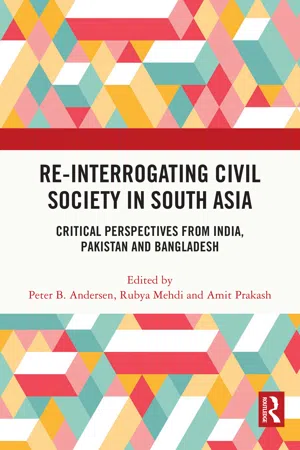
Re-Interrogating Civil Society in South Asia
Critical Perspectives from India, Pakistan and Bangladesh
- 314 pages
- English
- ePUB (mobile friendly)
- Available on iOS & Android
Re-Interrogating Civil Society in South Asia
Critical Perspectives from India, Pakistan and Bangladesh
About This Book
This book offers an overview of the history and development of civil society in three major nations of South Asia – Pakistan, India and Bangladesh – from colonial times to the present. It examines the liberalization of civil society since the 1980s, the needs it created for civil action, the professionalization of civil society organizations, and the extent to which civil society may benefit society at large in the context of local, national and global transformations in the economy, political regime and ideology.
The reader will find new insights on the interaction between the liberalization of multifaceted civil societies in the three countries, presenting contrasts such as restrictions put on women's organizations or labour unions and acceptance of religious organizations' activities. The volume looks at forms of transfer of civil society models, representation and democratic legitimacy of civil society organizations such as nongovernmental organizations, government organized NGOs and faith-based organizations, along with the structuring of civil society through legal frames as well as female, religious, and ethnic mobilizations around language and literature. Using wide-ranging empirical data and theoretical analyses, it deals with civil society issues relating to human rights and political challenges, justice, inequality, empowerment, and the role of bureaucracy, women's movements, and ethnic and linguistic minorities. It also presents early responses to the Covid-19 crisis in 2020 which created significant pressure on the states and on civil society.
This book will be useful to scholars and researchers of political studies, development studies, sociology, public policy and governance, law and human rights, as also to professionals in think tanks, civil society activists and NGOs.
Frequently asked questions
Information
Table of contents
- Cover
- Half Title
- Endorsement Page
- Title Page
- Copyright Page
- Table of Contents
- Contributors
- Preface and acknowledgements
- Chapter 1: Dissemination of civil society in South Asia
- Part I: Multifaceted and local civil societies in Pakistan, India and Bangladesh
- Part II: Civil society’s multiple hues and roles
- Part III: Civil mobilization among ethnic and linguistic minorities
- Index